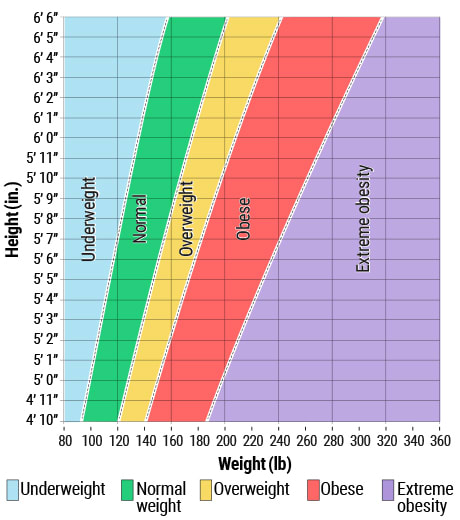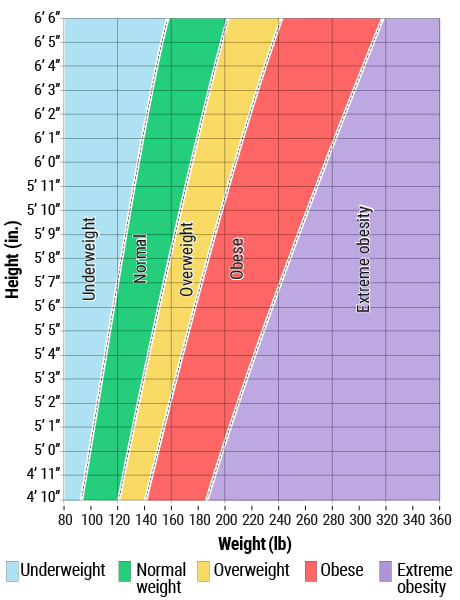On this page
What Is Obesity?
Obesity is a medical condition.
The World Health Organization defines obesity as "abnormal or excessive fat accumulation that presents a risk to health."
A screening tool called the body mass index (BMI) is a "measure of body fat based on height and weight."
Your BMI is one way to tell if your weight is in a healthy range. If it's between 18 and 24, you're at a healthy weight. A higher BMI means you're overweight or obese.
How common is obesity?
Obesity in the U.S. is common.
More than 41% of all adults are obese.
The obesity rate is highest in Black (nearly 50%) and Latino (over 45%) adults.
In children and teens, the obesity rate continues to rise, putting them at risk for health problems.
What are the types of obesity?
Doctors use different terms to talk about a person's weight:
- Overweight. Your BMI is at least 25 but less than 30.
- Obesity. Your BMI is at least 30.
- Morbid obesity. Your BMI is 40 or higher. Doctors also call this severe obesity.
Childhood obesity affects about 1 in 5 children and teenagers in the U.S.
Can't retrieve the content.
Body mass index (BMI) for adults


Adapted from: U.S. National Heart, Lung and Blood Institute; U.S. National Institutes of Health (2000). The Practical Guide: Identification, Evaluation, and Treatment of Overweight and Obesity in Adults. (NIH Publication No. 00-4084). Available online: http://www.nhlbi.nih.gov/guidelines/obesity/prctgd_c.pdf
Use the chart to locate your height and weight. The shaded regions on the chart correspond to weight ranges based on body mass index (BMI).
For adults 20 years and older:
- A BMI below 18.5 (light blue) is considered underweight.
- A BMI of 18.5 to 24.9 (green) is considered healthy.
- A BMI of 25 to 29.9 (yellow) is considered overweight.
- A BMI of 30 to 39.9 (red) is considered obese.
- A BMI of 40 or higher (purple) is considered extreme obesity.
Keep in mind that BMI is only a guide. It is not a tool to determine ideal body weight. It is a tool to help you see whether your weight is increasing your risk for disease. BMI does not work as well for people who are very muscular or those who have little muscle. A muscular person may have a high BMI but still have a healthy level of body fat. A person with very little muscle may have a normal BMI but have unhealthy levels of body fat.
If you are Asian, your health may be at risk with a lower BMI.
A person who has a large change in BMI, even if he or she is not overweight or underweight, should be evaluated to find the cause.
What causes obesity?
Obesity happens when you store more energy from food (calories) than you need.
It can occur if you:
- Don't get enough exercise.
- Eat mostly foods that are high in fat, salt, and sugar.
- Eat too much food.
- Have changes in certain cells in your body (genetic changes).
- Have trouble sleeping.
What are obesity risk factors and complications?
Obesity risk factors
You may be at higher risk for obesity if you gain weight because you:
- Have other health problems.
- Are under a lot of stress.
- Take certain medicines.
Where you live and who you live with can also increase your risk of obesity.
You may gain weight if:
- Healthy foods aren't easy to get where you live.
- People you live with don't eat healthy foods and exercise.
- You don't have safe places nearby to exercise and play.
Complications of obesity
Obesity can make it harder to stay healthy.
If you have this health issue, you're more likely to have:
- Depression.
- Heart disease or heart attack.
- Joint pain or other joint problems.
- Lung disease.
- Problems with memory and thinking.
- Some cancers.
- Stroke.
How can I prevent obesity?
You can help prevent obesity by not eating more calories than you use on most days.
You can also:
- Get enough sleep.
- Eat fruits, veggies, lean protein, and whole grains.
- Limit sugar-sweetened drinks.
- Move your body each day, and get your kids to move more.
Back to top
What Are the Signs and Symptoms of Obesity?
Obesity is a medical condition, but it doesn't always cause symptoms.
If you have obesity, you may have fatty tissue throughout your body.
You may also store excess fat in your:
Fatty tissue secretes hormones that can affect your immune system.
If you have too much fat, you're also at greater risk of:
Back to top
How Do You Diagnose Obesity?
Doctors use screening tools to diagnose obesity. They also account for other health issues you have.
BMI
Your doctor uses your height and weight to compute your BMI. This number tells them how likely you are to have high body fat.
To find your BMI, your doctor measures your height and weight.
They enter your height and weight into a BMI chart to find your BMI.
Your BMI is just one tool they use to help diagnose medical obesity. But it doesn't tell them about your overall health.
Waist circumference measurement
Your doctor may measure the distance around your waist with a tape measure.
They record your waist size in inches. This tells them how likely you are to have excess belly fat.
Back to top
How Do You Treat Obesity?
UPMC obesity care providers offer a few treatment options, including medical treatment for obesity.
The goal of obesity treatment is to help you get to — and stay at — a healthy weight. Lifestyle changes and other treatments can help you have better health.
Eat fewer calories and healthier foods
To lose weight, you must reduce the number of calories you eat and expend more energy than you consume
Your doctor will work with you to make changes to what you eat and drink to reduce calories.
They will help you eat healthier foods that help you feel full, such as:
- Fresh fruits and veggies.
- Lean proteins like chicken and fish.
- Whole grains.
Burn more calories through exercise
Your obesity care provider helps you find ways to move your body. Routine exercise helps you burn calories.
You may:
- Play active games with friends or family.
- Take more walks.
- Work out at a gym or with a trainer.
Lose weight with medical treatment for obesity
Your doctor may prescribe medicines to help you lose weight if they're right for you. You can take them along with making lifestyle changes.
If lifestyle changes don't help, your doctor may suggest an intragastric balloon for weight loss.
They place a soft balloon down your throat and into your stomach. They fill the balloon with liquid (saline), making you feel full so you eat less.
Lose weight with bariatric surgery
If you need to lose more than 100 pounds, your doctor may suggest weight loss — or bariatric surgery.
Weight loss surgery may help improve other health problems. Talk to your doctor to see if it's right for you.
Back to top
Learn More About Obesity and Weight Loss
From UPMC HealthBeat:
Back to top
By UPMC Editorial Staff.
Last reviewed on 2024-03-28.


















